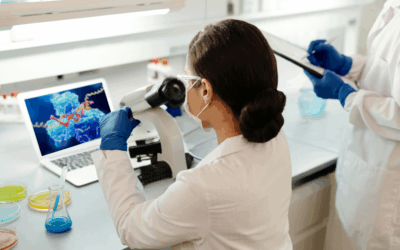The rise of gene therapies, cell therapies and advanced vaccine research has increased the demand for cellular immunity testing in a regulated environment to ensure the safety and efficacy of these treatments. However, cellular immunity testing is more complex than traditional immunoassays, as cell culture is included. ELISpot assays can overcome challenges associated with this testing and redefine our approach to cellular immunogenicity.
How ELISpot assays overcome challenges in immunogenicity testing
Infection, natural exposure and immunization induce a response by the body’s T cells. These cells learn and proliferate effector functions, so when they are faced with the same antigen, they secrete cytokines they were instructed to produce when they were first primed. ELISpot assays, first developed in 1988 by Cecil Czerkinsky, visualize the secretion of individual cells, testing the frequency of cells that produce cytokines, making it the most sensitive and effective tool for direct in vitro detection of antigen-specific T cells.
ELISpot assays address several limitations in cellular immunogenicity testing through the significant advantages they offer, including:
- High sensitivity, providing accurate ex vivo frequency measurements down to the 1/1,000,000 cell range. That frequency can reflect the magnitude of T cell immunity and determine the quality of T cell immunity.
- Ability to identify CD4 or CD8 T cell antigen-specific determinant.
- Capable of determining the affinity of antigen-specific T cells.
- Require small sample sizes compared to other cell detection techniques.
ELISpot Assay Use in Preclinical Development
In IND-enabling studies, ELISpot assays assess the immune response to a drug candidate. In immunology research, they are widely used to quantify the cytokine-producing cells and help evaluate the drug’s impact on the immune system. The assays provide evidence of antigen-specific immune responses and indicate if the drug candidate elicits an immune reaction or modulates immune function. An ELISpot assay can also be used to investigate the pharmacodynamics of a drug candidate and can monitor the activation and function of immune cells. This helps researchers gather the data needed to make crucial decisions on advancing investigational drugs into clinical trials.
Here’s a breakdown of how ELISpot assay can be used in preclinical investigations:
- Assessment of cellular immune response: quantifying the number of antigen-specific T cells producing specific cytokines.
- Vaccine efficacy evaluation: measuring the immune response induced by vaccines.
- Monitoring immune cell activation and differentiation: helping monitor activation and differentiation of immune cells such as T helper subsets or cytotoxic T cells. This helps to characterize immune cell populations and their functional properties.
- Screening and characterization of immunotherapeutic agents: this helps identify drugs that elicit the desired immune response or target specific cell populations.
- Investigation of immune tolerance and regulatory mechanisms: measuring the frequency and function of regulatory T cells or other immunosuppressive cell populations.
How ELISpot Assays Compare to Other Methods
Other techniques, such as ELISA or flow cytometry, can also be used for cellular immunogenicity testing. But ELISpot Assays have an advantage over these other methods when researchers need to differentiate the immune type between TH1 and TH2, T cell immune monitoring results don’t match clinical outcomes, high throughput analysis is necessary, or when T cell functional status and affinity will be detected.
Regarding cost-effectiveness, ELISA is widely considered more efficient, often providing results within a day. ELISpot assays can be more time-consuming—often taking 2-3 days for each run—but FluoroSpot can test two or more cytokines in the same plate. At the same time, ELISA is only capable of running one. FACs is considered the least cost-effective option as the equipment and maintenance costs are expensive.
Regulatory compliance
Requirements and regulations for using ELISpot assays vary from region to region and different regulatory bodies have varying expectations. Before performing this testing, researchers are advised to understand the appropriate requirements of their target region and consult with regulatory authorities to keep their timelines intact.
The primary considerations for using these assays are equipment and consumable certification, laboratory qualification and certification, sample collection and processing, quality control and validation, and proper data management and recording.
Final thoughts
ELISpot assays help drug sponsors and developers understand the immune regulatory effects of drug candidates and the immune cells’ function by assessing specific cells’ activity by detecting the secreted cytokines. They are a crucial, cost-efficient and effective way to test cellular immunogenicity.
The assays can also be used to determine the immune effects of potential vaccines by detecting cytokines secreted by specific cell types, such as T cells, and assessing the immuno-protective capacity of the vaccine. As researchers worldwide work hard to find new and more effective ways to protect against deadly and destructive diseases, ELISpot assays will become evermore integral to assessing and optimizing the efficacy of these lifesaving vaccines.
As a global company with operations across Asia, Europe, and North America, WuXi AppTec provides a broad portfolio of R&D and manufacturing services that enable the global pharmaceutical and life sciences industry to advance discoveries and deliver groundbreaking treatments to patients. Through its unique business models, WuXi AppTec’s integrated, end-to-end services include chemistry drug CRDMO (Contract Research, Development and Manufacturing Organization), biology discovery, preclinical testing and clinical research services, helping customers improve the productivity of advancing healthcare products through cost-effective and efficient solutions. WuXi AppTec received an AA ESG rating from MSCI for the fourth consecutive year in 2024 and its open-access platform is enabling around 6,000 customers from over 30 countries to improve the health of those in need – and to realize the vision that “every drug can be made and every disease can be treated.”


